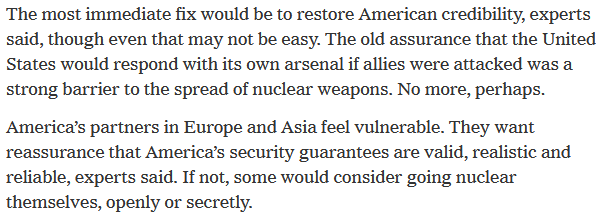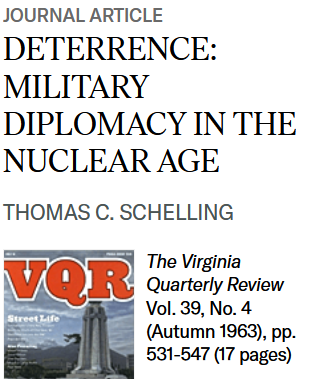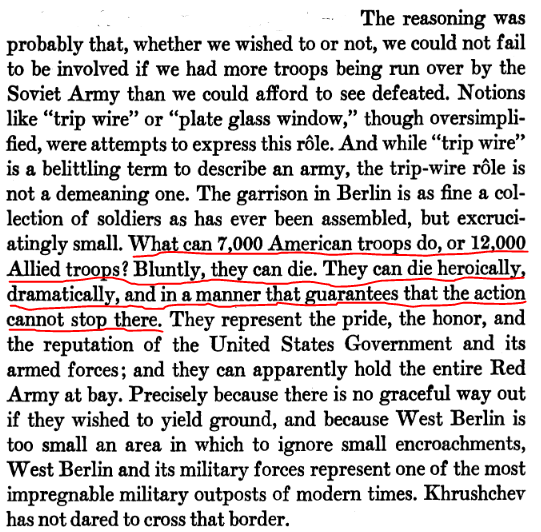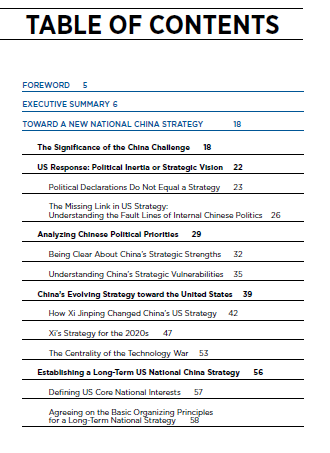
After 4 years of Donald Trump, the US must "reassure" its allies.
That's what I'm reading/hearing lately, such as in this @nytimes piece. What do international relations scholars know about reassuring allies? Can it be done? Is it even needed?
[THREAD]
nytimes.com/2021/02/10/wor…
That's what I'm reading/hearing lately, such as in this @nytimes piece. What do international relations scholars know about reassuring allies? Can it be done? Is it even needed?
[THREAD]
nytimes.com/2021/02/10/wor…
This passage from the article captures well the call for "reassurance": the US must convince its allies in Asia and Europe that the US would indeed use its nukes to protect them. 

That's a tall order!
Indeed, such a tall order that it's been a major question explored by international relations scholars for a long time. A LONG TIME.
Indeed, such a tall order that it's been a major question explored by international relations scholars for a long time. A LONG TIME.
The topic was of keen debate in the 1950s, with Henry Kissinger writing a series of pieces on the topic, such as this 1956 @ForeignAffairs article
foreignaffairs.com/articles/1956-…
foreignaffairs.com/articles/1956-…
The academic discussion picked up in the late 1950s and early 1960s.
This included Robert Schelling's paper in the first issue of the Journal of Conflict Resolution...
journals.sagepub.com/doi/10.1177/00…
This included Robert Schelling's paper in the first issue of the Journal of Conflict Resolution...
journals.sagepub.com/doi/10.1177/00…
That last book offered a famous passage on US credibility to allies that first appeared three years earlier in the Virginia Quarterly Review.
jstor.org/stable/2644026…
jstor.org/stable/2644026…

In other words, "tripwire forces" who die at the beginning of an enemy attack are critical to "reassuring" allies that America will indeed respond, perhaps even with nukes.
So key to "assurance" is stationing US forces on allied territory.
Does it work?
Does it work?
On the one hand, it's really hard to say.
The core difficulty with evaluating deterrence is "selection bias" and an inability to see the "counterfactual" (i.e. we only observe deterrence failures).
The core difficulty with evaluating deterrence is "selection bias" and an inability to see the "counterfactual" (i.e. we only observe deterrence failures).
https://twitter.com/ProfPaulPoast/status/1102353106069868545
On the other hand, much research has looked directly at "tripwire" forces to determine if they do indeed enhance deterrence.
What the research finds is not supportive.
What the research finds is not supportive.
@profmusgrave & @Steven_m_ward report in this @monkeycageblog piece that American's are actually not so keen on responding to the deaths of US troops with force: it depended much more on factors such as "likelihood of success"
washingtonpost.com/news/monkey-ca…
washingtonpost.com/news/monkey-ca…
@mcfuhrmann & Todd Sechser in @AJPS_Editor show that placing US nukes on allied territory doesn't do much either to enhance deterrence.
onlinelibrary.wiley.com/doi/full/10.11…
onlinelibrary.wiley.com/doi/full/10.11…
Another problem with forward deployed tripwires is that they can reduce the willingness of local populations to fight for themselves...
tandfonline.com/doi/full/10.10…
tandfonline.com/doi/full/10.10…
...though @carlammm, @flynnpolsci, @michaelallen, & Andrew Stravers report in @apsrjournal that forward deployed forces can create positive views of the US in host countries.
cambridge.org/core/journals/…
cambridge.org/core/journals/…
So tripwires & forward deployment of forces might well be overrated as a means of "reassuring" an ally.
What else can be done?
What else can be done?
For some states that don't yet have alliances, creating formal military cooperation agreements can have value. So also does flat out giving "aid" (read $$). See @ALanoszka, @YarhiMilo & Zack Cooper in @Journal_IS.
mitpressjournals.org/doi/abs/10.116…
mitpressjournals.org/doi/abs/10.116…
The US might also consider renegotiating some of its alliance agreements to include more precise conditions for support. See @mattes_michaela in @IntOrgJournal
cambridge.org/core/journals/…
cambridge.org/core/journals/…
The US can continue to issue public "statements of support" to skittish allies, which @BrianDBlank explored recently in @ISQ_Jrnl
academic.oup.com/isq/article-ab…
academic.oup.com/isq/article-ab…
Even private statements of support have some merit too, as @YarhiMilo & Roseanne McManus explore in this @IntOrgJournal piece.
cambridge.org/core/journals/…
cambridge.org/core/journals/…
The US can engage in military exercises (as Ralph Clem discussed in @TXNatSecReview)
tnsr.org/2018/11/milita…
tnsr.org/2018/11/milita…
But here's the thing: you can never give ENOUGH of such statements. Reassurance doesn't end: You have to be constantly visiting, stating publicly your commitment, & taking actions.
Reassurance is a process, not an objective. There is no one policy, like tripwires, that will achieve it.
[END]
[END]
• • •
Missing some Tweet in this thread? You can try to
force a refresh









